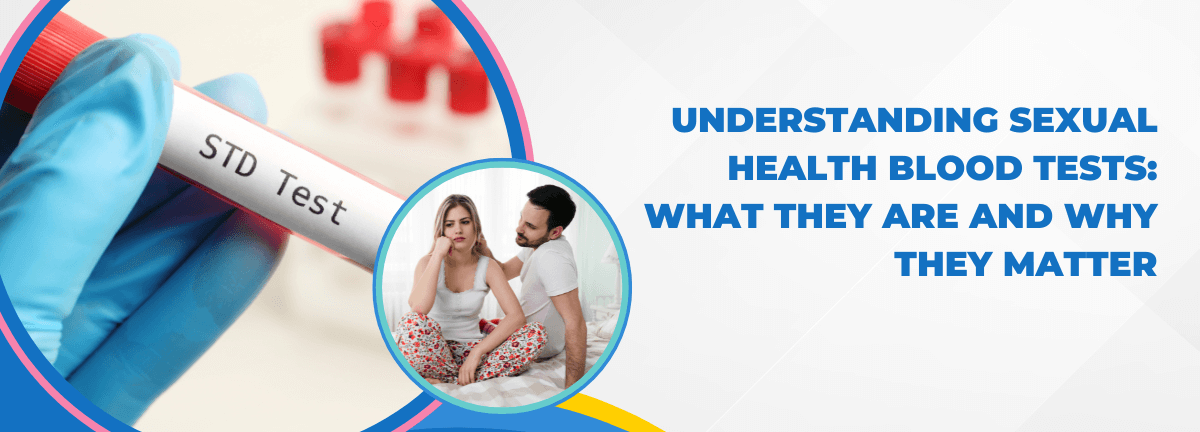Sexual health is a crucial aspect of overall well-being, encompassing physical, emotional, mental, and social dimensions. To maintain optimal sexual health, regular check-ups and screenings are essential. One of the most effective ways to monitor and manage sexual health is through blood tests. This blog will explore what sexual health blood tests are, what they test for, and why they are vital for maintaining a healthy lifestyle.
What Are Sexual Health Blood Tests?
Sexual health blood tests are laboratory tests that analyze a sample of your blood to detect various infections, diseases, and conditions related to sexual activity. These tests provide a comprehensive overview of your sexual health, allowing healthcare providers to diagnose, treat, and prevent sexually transmitted infections (STIs) and other related health issues.
What Do Sexual Health Blood Tests Screen For?
Sexual health blood tests can detect a wide range of infections and conditions, including:
- HIV (Human Immunodeficiency Virus):
HIV Antibody/Antigen Test: This test detects both HIV antibodies and antigens in the blood. Early detection of HIV is crucial for managing and treating the virus effectively.
2.Syphilis:
Rapid Plasma Reagin (RPR) Test: This test screens for syphilis by detecting antibodies produced in response to the infection.
Treponema Pallidum Hemagglutination Assay (TPHA): This confirmatory test is used to verify a positive RPR test result.
3. Hepatitis B and C:
Hepatitis B Surface Antigen (HBsAg): This test detects the presence of the hepatitis B virus in the blood.
Hepatitis C Antibody Test: This test identifies antibodies produced in response to hepatitis C infection.
4. Herpes Simplex Virus (HSV):
HSV Antibody Test: This test detects antibodies for HSV-1 and HSV-2, which cause oral and genital herpes, respectively.
5. Chlamydia and Gonorrhea:
Nucleic Acid Amplification Test (NAAT): While usually conducted using urine or swab samples, blood tests can also detect the presence of these bacteria in certain cases.
6. Human Papillomavirus (HPV):
HPV DNA Test: This test identifies high-risk strains of HPV that can lead to cervical cancer and other cancers.
7.Other Tests:
Trichomoniasis: Blood tests can detect antibodies to the Trichomonas parasite.
Mycoplasma genitalium: Testing can identify this sexually transmitted bacterium, which can cause infections in the reproductive tract.
Why Are Sexual Health Blood Tests Important?
-
Early Detection and Treatment:
Diagnosing STIs and other infections at an early stage is essential because it allows for timely medical intervention. This not only helps in reducing the chances of developing severe complications but also plays a crucial role in preventing the further spread of these infections to others. Therefore, seeking prompt medical attention upon noticing any symptoms is imperative for effective management and control of these conditions.
2. Prevention of Long-Term Health Issues:
Untreated sexually transmitted infections (STIs) can lead to serious health problems. These problems include infertility, chronic pain in the pelvic area, and an increased risk of certain types of cancers, such as cervical cancer. It’s important to seek medical attention and treatment for STIs to prevent these adverse health outcomes.
3. Protection of Partners:
Regular testing for sexually transmitted infections is crucial for keeping track of your health status. Being aware of your sexual health not only allows you to take necessary precautions to protect yourself but also empowers you to safeguard your sexual partners from potential infections. Regular testing helps to ensure that any infections are detected early, allowing for timely treatment and reducing the risk of transmission to others. By staying proactive about testing, you contribute to a healthier and safer sexual environment for yourself and your partners.
4. Peace of Mind:
Regularly getting tested for sexually transmitted infections and maintaining open communication with your healthcare provider can help you stay informed about your sexual health status. Understanding your current status can alleviate anxiety and provide you with peace of mind, enabling you to make informed decisions and confidently pursue a healthy and satisfying sex life.
5. Public Health:
Regular and consistent testing for sexually transmitted infections (STIs) plays a crucial role in controlling the spread of these infections within the community. By identifying and addressing cases early on, routine testing contributes significantly to improving public health outcomes by reducing the transmission of STIs and promoting timely treatment. This, in turn, helps to prevent the potential long-term health complications associated with untreated STIs and supports overall community well-being..
How to Prepare for a Sexual Health Blood Test
- Schedule an Appointment: Contact your healthcare provider to schedule a sexual health screening.
- Avoid Unprotected Sex: To ensure accurate results, avoid unprotected sex in the days leading up to the test.
- Provide Honest Information: Be honest with your healthcare provider about your sexual history and any symptoms you may be experiencing.
- Follow Pre-Test Instructions: Follow any specific instructions given by your healthcare provider, such as fasting if required.
Conclusion
Sexual health blood tests are a vital component of comprehensive healthcare. They provide crucial insights into your health status, enabling early detection, treatment, and prevention of sexually transmitted infections and other related conditions. Regular testing not only protects your health but also the health of your partners and the wider community.
For more information on sexual health blood tests and to schedule an appointment, visit https://miracleinside.com/bloodtest/245/sexual-screen-blood-tests.
